Cloud-Based ERP System: Annotated Bibliography & Self-Evaluation
VerifiedAdded on 2023/04/21
|16
|3351
|319
Annotated Bibliography
AI Summary
This assignment presents an annotated bibliography centered on cloud-based Enterprise Resource Planning (ERP) systems. It covers a range of research papers discussing the role of ERP in manufacturing, challenges in implementation, applications in cloud manufacturing and robotics, software engineering concepts, and organizational-level continuance. The bibliography also explores the integration of the TAM-TOE model, the software factory approach, real-time production logistics, adoption concerns, barriers in SMEs, industrial automation, and advanced planning systems. Furthermore, it addresses the technology's capabilities in managing structured and unstructured data, its special features like financial and customer relationship management, cost considerations, and the industries it impacts. The author concludes that cloud-based ERP systems are beneficial for society due to their ability to effectively manage complex organizational levels, improve back and front-office operations, and offer enhanced security compared to physical ERP systems.

Running head: CLOUD-BASED ERP SYSTEM
Cloud-based ERP system
Name of the Student
Name of the University
Author’s Note
Cloud-based ERP system
Name of the Student
Name of the University
Author’s Note
Paraphrase This Document
Need a fresh take? Get an instant paraphrase of this document with our AI Paraphraser
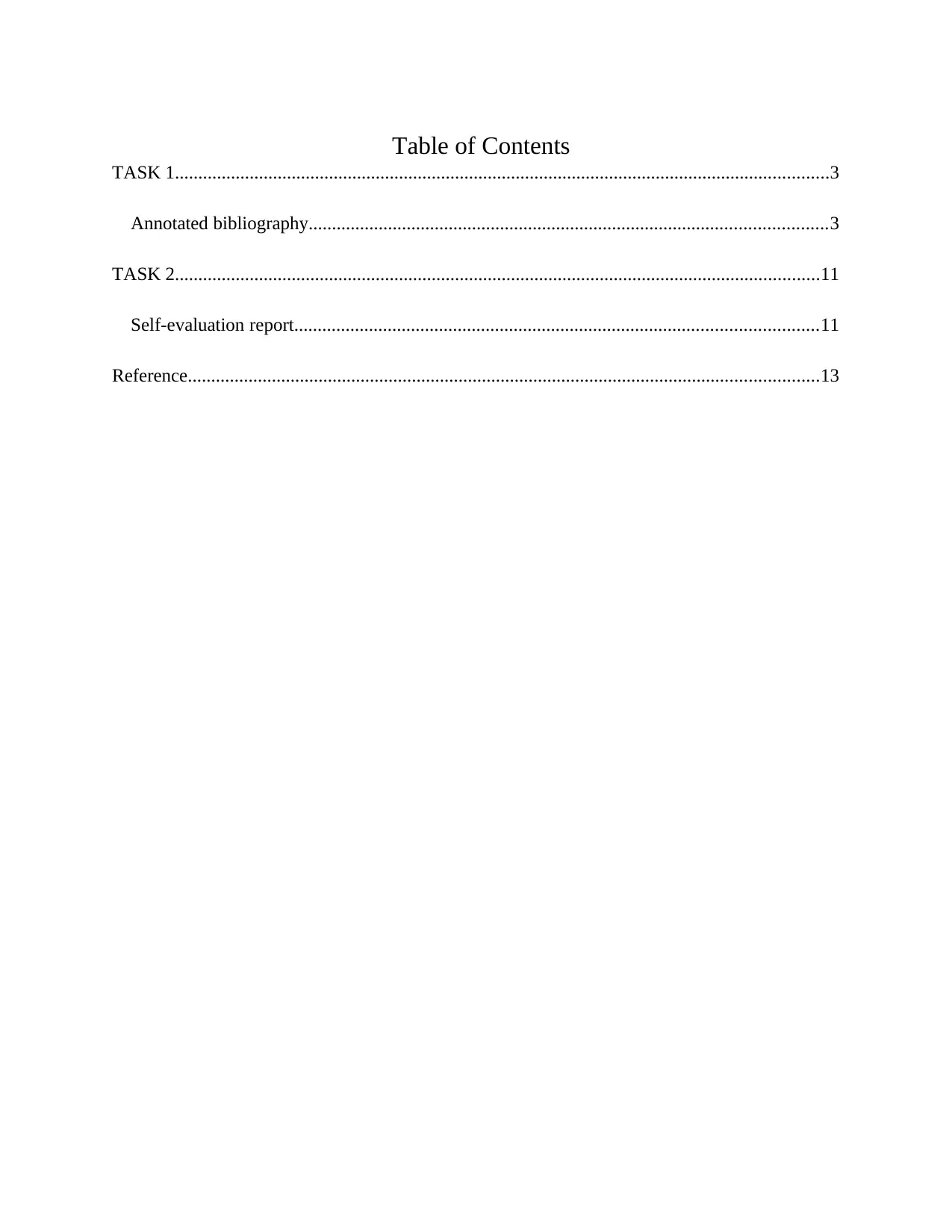
Table of Contents
TASK 1............................................................................................................................................3
Annotated bibliography...............................................................................................................3
TASK 2..........................................................................................................................................11
Self-evaluation report................................................................................................................11
Reference.......................................................................................................................................13
TASK 1............................................................................................................................................3
Annotated bibliography...............................................................................................................3
TASK 2..........................................................................................................................................11
Self-evaluation report................................................................................................................11
Reference.......................................................................................................................................13
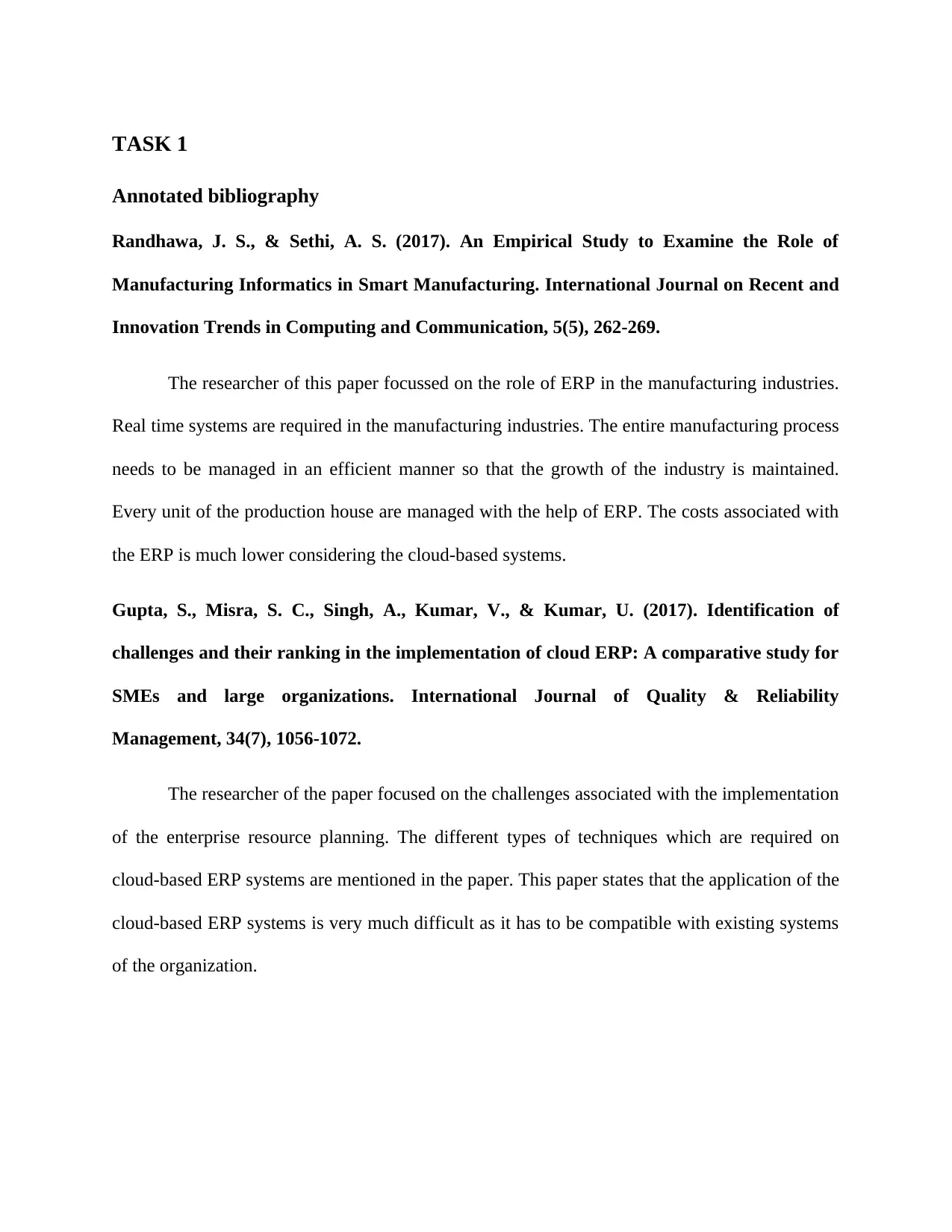
TASK 1
Annotated bibliography
Randhawa, J. S., & Sethi, A. S. (2017). An Empirical Study to Examine the Role of
Manufacturing Informatics in Smart Manufacturing. International Journal on Recent and
Innovation Trends in Computing and Communication, 5(5), 262-269.
The researcher of this paper focussed on the role of ERP in the manufacturing industries.
Real time systems are required in the manufacturing industries. The entire manufacturing process
needs to be managed in an efficient manner so that the growth of the industry is maintained.
Every unit of the production house are managed with the help of ERP. The costs associated with
the ERP is much lower considering the cloud-based systems.
Gupta, S., Misra, S. C., Singh, A., Kumar, V., & Kumar, U. (2017). Identification of
challenges and their ranking in the implementation of cloud ERP: A comparative study for
SMEs and large organizations. International Journal of Quality & Reliability
Management, 34(7), 1056-1072.
The researcher of the paper focused on the challenges associated with the implementation
of the enterprise resource planning. The different types of techniques which are required on
cloud-based ERP systems are mentioned in the paper. This paper states that the application of the
cloud-based ERP systems is very much difficult as it has to be compatible with existing systems
of the organization.
Annotated bibliography
Randhawa, J. S., & Sethi, A. S. (2017). An Empirical Study to Examine the Role of
Manufacturing Informatics in Smart Manufacturing. International Journal on Recent and
Innovation Trends in Computing and Communication, 5(5), 262-269.
The researcher of this paper focussed on the role of ERP in the manufacturing industries.
Real time systems are required in the manufacturing industries. The entire manufacturing process
needs to be managed in an efficient manner so that the growth of the industry is maintained.
Every unit of the production house are managed with the help of ERP. The costs associated with
the ERP is much lower considering the cloud-based systems.
Gupta, S., Misra, S. C., Singh, A., Kumar, V., & Kumar, U. (2017). Identification of
challenges and their ranking in the implementation of cloud ERP: A comparative study for
SMEs and large organizations. International Journal of Quality & Reliability
Management, 34(7), 1056-1072.
The researcher of the paper focused on the challenges associated with the implementation
of the enterprise resource planning. The different types of techniques which are required on
cloud-based ERP systems are mentioned in the paper. This paper states that the application of the
cloud-based ERP systems is very much difficult as it has to be compatible with existing systems
of the organization.
⊘ This is a preview!⊘
Do you want full access?
Subscribe today to unlock all pages.

Trusted by 1+ million students worldwide
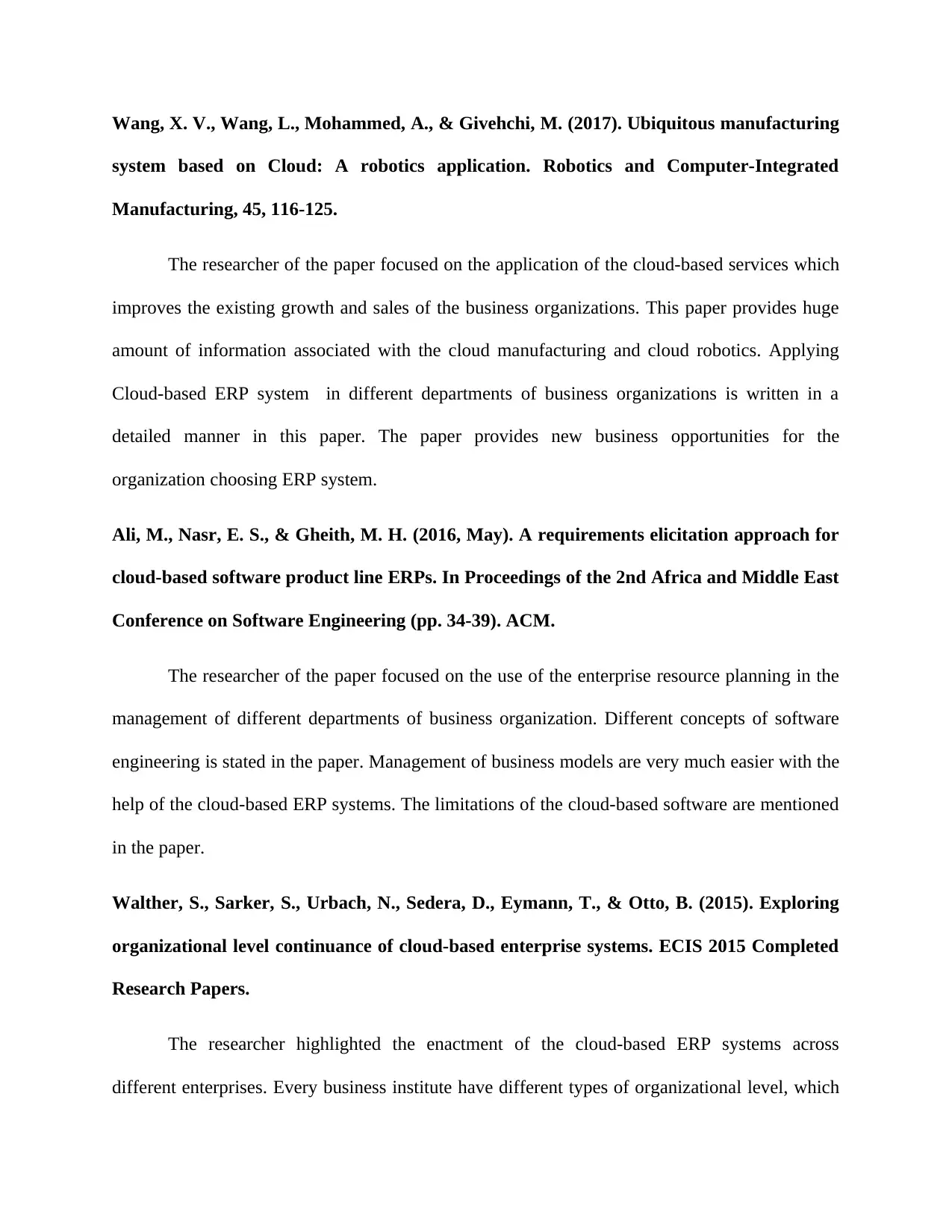
Wang, X. V., Wang, L., Mohammed, A., & Givehchi, M. (2017). Ubiquitous manufacturing
system based on Cloud: A robotics application. Robotics and Computer-Integrated
Manufacturing, 45, 116-125.
The researcher of the paper focused on the application of the cloud-based services which
improves the existing growth and sales of the business organizations. This paper provides huge
amount of information associated with the cloud manufacturing and cloud robotics. Applying
Cloud-based ERP system in different departments of business organizations is written in a
detailed manner in this paper. The paper provides new business opportunities for the
organization choosing ERP system.
Ali, M., Nasr, E. S., & Gheith, M. H. (2016, May). A requirements elicitation approach for
cloud-based software product line ERPs. In Proceedings of the 2nd Africa and Middle East
Conference on Software Engineering (pp. 34-39). ACM.
The researcher of the paper focused on the use of the enterprise resource planning in the
management of different departments of business organization. Different concepts of software
engineering is stated in the paper. Management of business models are very much easier with the
help of the cloud-based ERP systems. The limitations of the cloud-based software are mentioned
in the paper.
Walther, S., Sarker, S., Urbach, N., Sedera, D., Eymann, T., & Otto, B. (2015). Exploring
organizational level continuance of cloud-based enterprise systems. ECIS 2015 Completed
Research Papers.
The researcher highlighted the enactment of the cloud-based ERP systems across
different enterprises. Every business institute have different types of organizational level, which
system based on Cloud: A robotics application. Robotics and Computer-Integrated
Manufacturing, 45, 116-125.
The researcher of the paper focused on the application of the cloud-based services which
improves the existing growth and sales of the business organizations. This paper provides huge
amount of information associated with the cloud manufacturing and cloud robotics. Applying
Cloud-based ERP system in different departments of business organizations is written in a
detailed manner in this paper. The paper provides new business opportunities for the
organization choosing ERP system.
Ali, M., Nasr, E. S., & Gheith, M. H. (2016, May). A requirements elicitation approach for
cloud-based software product line ERPs. In Proceedings of the 2nd Africa and Middle East
Conference on Software Engineering (pp. 34-39). ACM.
The researcher of the paper focused on the use of the enterprise resource planning in the
management of different departments of business organization. Different concepts of software
engineering is stated in the paper. Management of business models are very much easier with the
help of the cloud-based ERP systems. The limitations of the cloud-based software are mentioned
in the paper.
Walther, S., Sarker, S., Urbach, N., Sedera, D., Eymann, T., & Otto, B. (2015). Exploring
organizational level continuance of cloud-based enterprise systems. ECIS 2015 Completed
Research Papers.
The researcher highlighted the enactment of the cloud-based ERP systems across
different enterprises. Every business institute have different types of organizational level, which
Paraphrase This Document
Need a fresh take? Get an instant paraphrase of this document with our AI Paraphraser
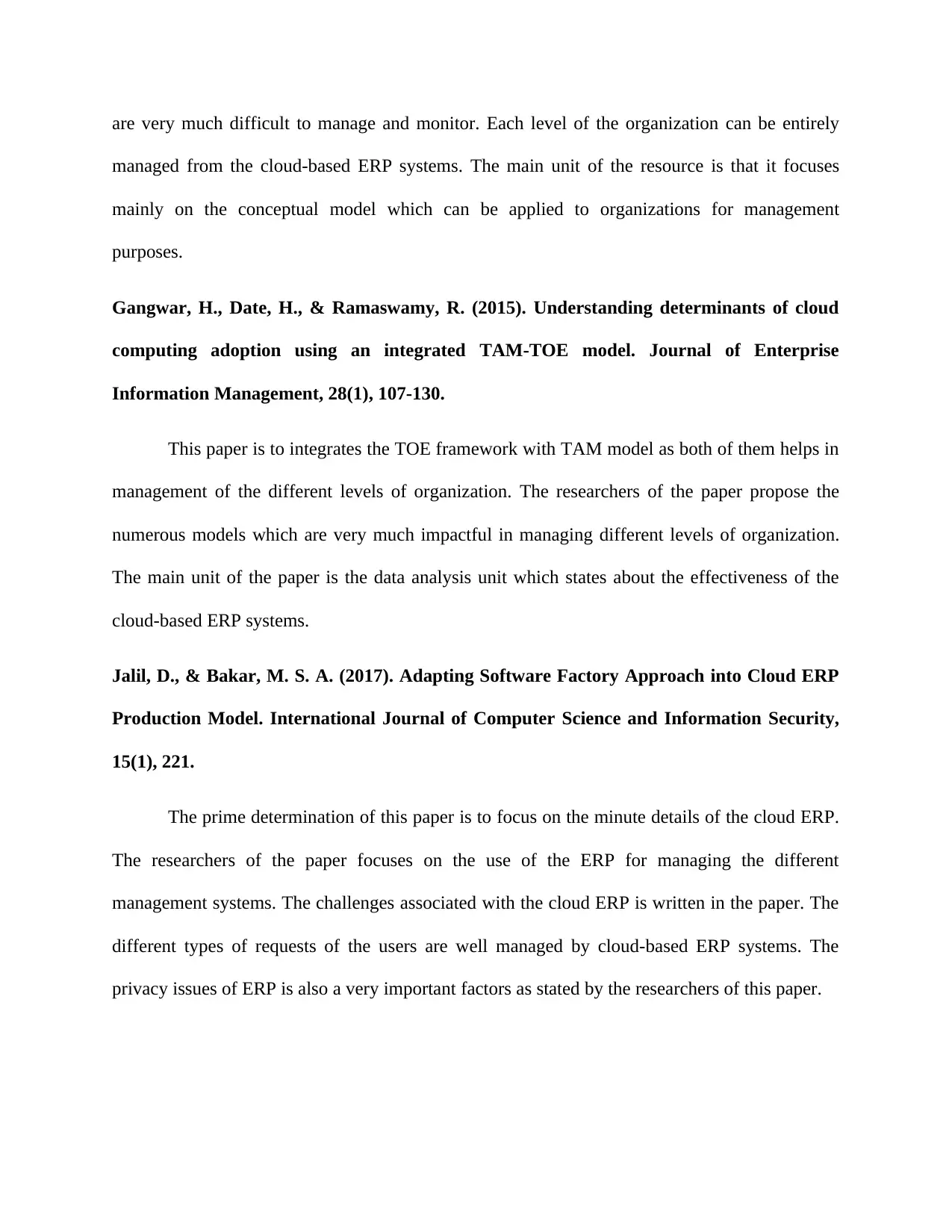
are very much difficult to manage and monitor. Each level of the organization can be entirely
managed from the cloud-based ERP systems. The main unit of the resource is that it focuses
mainly on the conceptual model which can be applied to organizations for management
purposes.
Gangwar, H., Date, H., & Ramaswamy, R. (2015). Understanding determinants of cloud
computing adoption using an integrated TAM-TOE model. Journal of Enterprise
Information Management, 28(1), 107-130.
This paper is to integrates the TOE framework with TAM model as both of them helps in
management of the different levels of organization. The researchers of the paper propose the
numerous models which are very much impactful in managing different levels of organization.
The main unit of the paper is the data analysis unit which states about the effectiveness of the
cloud-based ERP systems.
Jalil, D., & Bakar, M. S. A. (2017). Adapting Software Factory Approach into Cloud ERP
Production Model. International Journal of Computer Science and Information Security,
15(1), 221.
The prime determination of this paper is to focus on the minute details of the cloud ERP.
The researchers of the paper focuses on the use of the ERP for managing the different
management systems. The challenges associated with the cloud ERP is written in the paper. The
different types of requests of the users are well managed by cloud-based ERP systems. The
privacy issues of ERP is also a very important factors as stated by the researchers of this paper.
managed from the cloud-based ERP systems. The main unit of the resource is that it focuses
mainly on the conceptual model which can be applied to organizations for management
purposes.
Gangwar, H., Date, H., & Ramaswamy, R. (2015). Understanding determinants of cloud
computing adoption using an integrated TAM-TOE model. Journal of Enterprise
Information Management, 28(1), 107-130.
This paper is to integrates the TOE framework with TAM model as both of them helps in
management of the different levels of organization. The researchers of the paper propose the
numerous models which are very much impactful in managing different levels of organization.
The main unit of the paper is the data analysis unit which states about the effectiveness of the
cloud-based ERP systems.
Jalil, D., & Bakar, M. S. A. (2017). Adapting Software Factory Approach into Cloud ERP
Production Model. International Journal of Computer Science and Information Security,
15(1), 221.
The prime determination of this paper is to focus on the minute details of the cloud ERP.
The researchers of the paper focuses on the use of the ERP for managing the different
management systems. The challenges associated with the cloud ERP is written in the paper. The
different types of requests of the users are well managed by cloud-based ERP systems. The
privacy issues of ERP is also a very important factors as stated by the researchers of this paper.
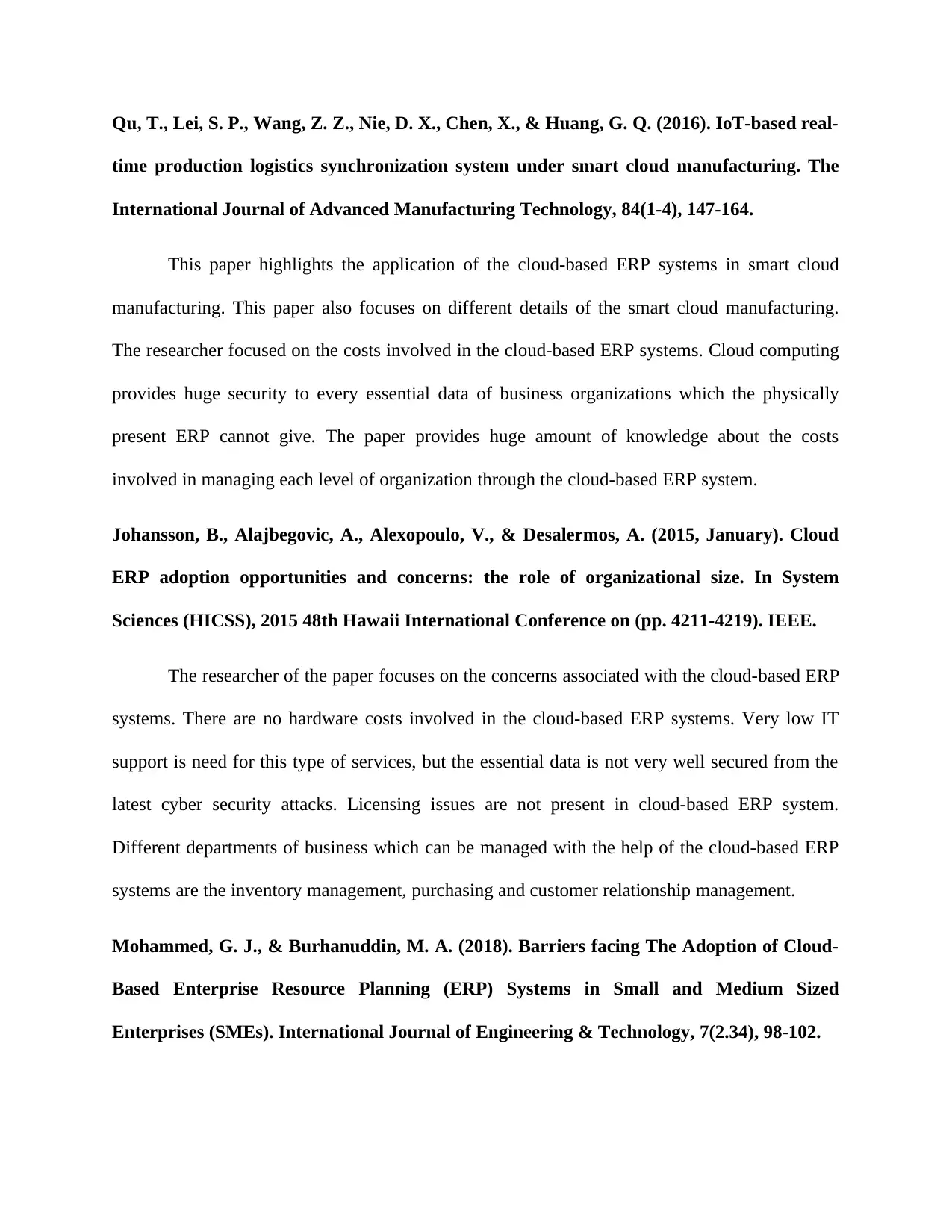
Qu, T., Lei, S. P., Wang, Z. Z., Nie, D. X., Chen, X., & Huang, G. Q. (2016). IoT-based real-
time production logistics synchronization system under smart cloud manufacturing. The
International Journal of Advanced Manufacturing Technology, 84(1-4), 147-164.
This paper highlights the application of the cloud-based ERP systems in smart cloud
manufacturing. This paper also focuses on different details of the smart cloud manufacturing.
The researcher focused on the costs involved in the cloud-based ERP systems. Cloud computing
provides huge security to every essential data of business organizations which the physically
present ERP cannot give. The paper provides huge amount of knowledge about the costs
involved in managing each level of organization through the cloud-based ERP system.
Johansson, B., Alajbegovic, A., Alexopoulo, V., & Desalermos, A. (2015, January). Cloud
ERP adoption opportunities and concerns: the role of organizational size. In System
Sciences (HICSS), 2015 48th Hawaii International Conference on (pp. 4211-4219). IEEE.
The researcher of the paper focuses on the concerns associated with the cloud-based ERP
systems. There are no hardware costs involved in the cloud-based ERP systems. Very low IT
support is need for this type of services, but the essential data is not very well secured from the
latest cyber security attacks. Licensing issues are not present in cloud-based ERP system.
Different departments of business which can be managed with the help of the cloud-based ERP
systems are the inventory management, purchasing and customer relationship management.
Mohammed, G. J., & Burhanuddin, M. A. (2018). Barriers facing The Adoption of Cloud-
Based Enterprise Resource Planning (ERP) Systems in Small and Medium Sized
Enterprises (SMEs). International Journal of Engineering & Technology, 7(2.34), 98-102.
time production logistics synchronization system under smart cloud manufacturing. The
International Journal of Advanced Manufacturing Technology, 84(1-4), 147-164.
This paper highlights the application of the cloud-based ERP systems in smart cloud
manufacturing. This paper also focuses on different details of the smart cloud manufacturing.
The researcher focused on the costs involved in the cloud-based ERP systems. Cloud computing
provides huge security to every essential data of business organizations which the physically
present ERP cannot give. The paper provides huge amount of knowledge about the costs
involved in managing each level of organization through the cloud-based ERP system.
Johansson, B., Alajbegovic, A., Alexopoulo, V., & Desalermos, A. (2015, January). Cloud
ERP adoption opportunities and concerns: the role of organizational size. In System
Sciences (HICSS), 2015 48th Hawaii International Conference on (pp. 4211-4219). IEEE.
The researcher of the paper focuses on the concerns associated with the cloud-based ERP
systems. There are no hardware costs involved in the cloud-based ERP systems. Very low IT
support is need for this type of services, but the essential data is not very well secured from the
latest cyber security attacks. Licensing issues are not present in cloud-based ERP system.
Different departments of business which can be managed with the help of the cloud-based ERP
systems are the inventory management, purchasing and customer relationship management.
Mohammed, G. J., & Burhanuddin, M. A. (2018). Barriers facing The Adoption of Cloud-
Based Enterprise Resource Planning (ERP) Systems in Small and Medium Sized
Enterprises (SMEs). International Journal of Engineering & Technology, 7(2.34), 98-102.
⊘ This is a preview!⊘
Do you want full access?
Subscribe today to unlock all pages.

Trusted by 1+ million students worldwide
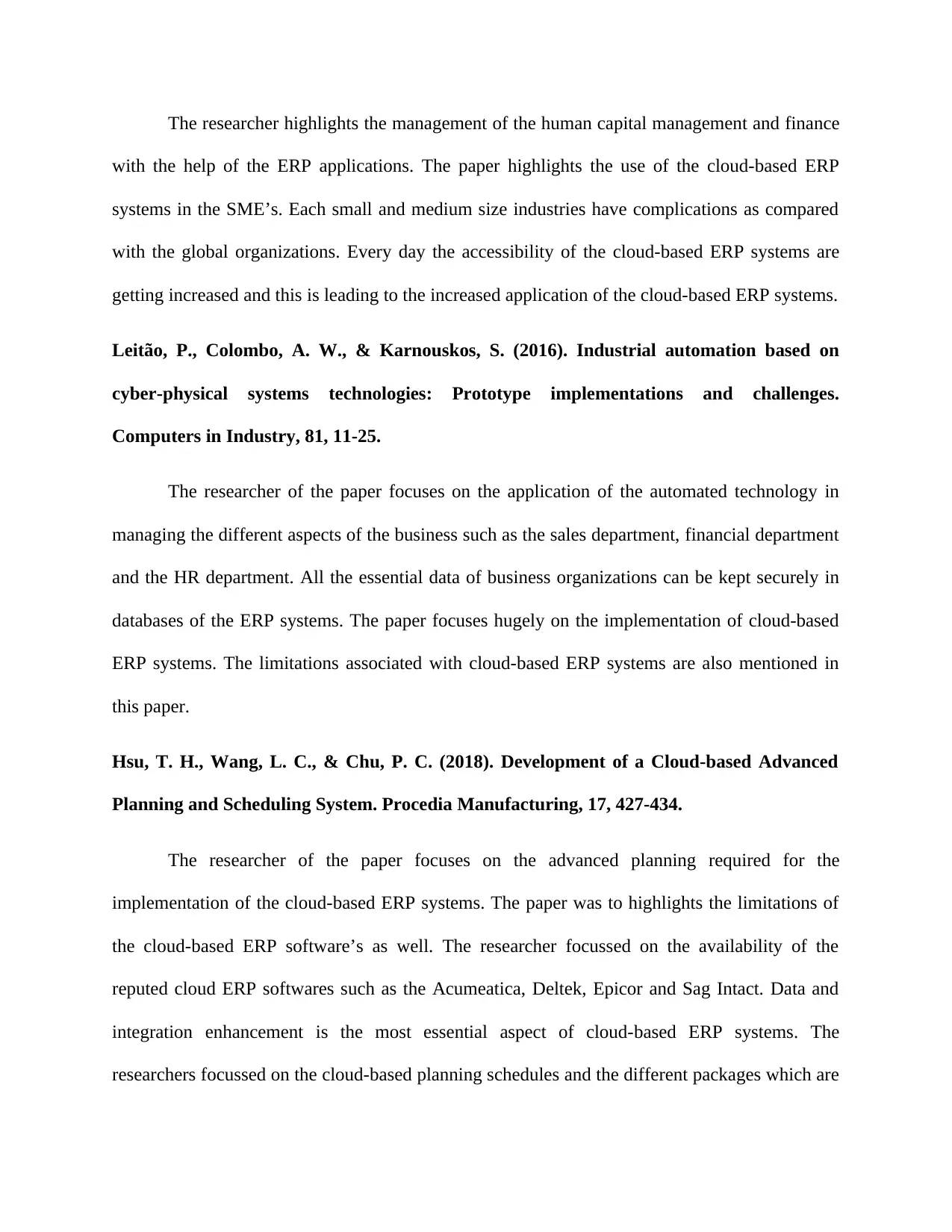
The researcher highlights the management of the human capital management and finance
with the help of the ERP applications. The paper highlights the use of the cloud-based ERP
systems in the SME’s. Each small and medium size industries have complications as compared
with the global organizations. Every day the accessibility of the cloud-based ERP systems are
getting increased and this is leading to the increased application of the cloud-based ERP systems.
Leitão, P., Colombo, A. W., & Karnouskos, S. (2016). Industrial automation based on
cyber-physical systems technologies: Prototype implementations and challenges.
Computers in Industry, 81, 11-25.
The researcher of the paper focuses on the application of the automated technology in
managing the different aspects of the business such as the sales department, financial department
and the HR department. All the essential data of business organizations can be kept securely in
databases of the ERP systems. The paper focuses hugely on the implementation of cloud-based
ERP systems. The limitations associated with cloud-based ERP systems are also mentioned in
this paper.
Hsu, T. H., Wang, L. C., & Chu, P. C. (2018). Development of a Cloud-based Advanced
Planning and Scheduling System. Procedia Manufacturing, 17, 427-434.
The researcher of the paper focuses on the advanced planning required for the
implementation of the cloud-based ERP systems. The paper was to highlights the limitations of
the cloud-based ERP software’s as well. The researcher focussed on the availability of the
reputed cloud ERP softwares such as the Acumeatica, Deltek, Epicor and Sag Intact. Data and
integration enhancement is the most essential aspect of cloud-based ERP systems. The
researchers focussed on the cloud-based planning schedules and the different packages which are
with the help of the ERP applications. The paper highlights the use of the cloud-based ERP
systems in the SME’s. Each small and medium size industries have complications as compared
with the global organizations. Every day the accessibility of the cloud-based ERP systems are
getting increased and this is leading to the increased application of the cloud-based ERP systems.
Leitão, P., Colombo, A. W., & Karnouskos, S. (2016). Industrial automation based on
cyber-physical systems technologies: Prototype implementations and challenges.
Computers in Industry, 81, 11-25.
The researcher of the paper focuses on the application of the automated technology in
managing the different aspects of the business such as the sales department, financial department
and the HR department. All the essential data of business organizations can be kept securely in
databases of the ERP systems. The paper focuses hugely on the implementation of cloud-based
ERP systems. The limitations associated with cloud-based ERP systems are also mentioned in
this paper.
Hsu, T. H., Wang, L. C., & Chu, P. C. (2018). Development of a Cloud-based Advanced
Planning and Scheduling System. Procedia Manufacturing, 17, 427-434.
The researcher of the paper focuses on the advanced planning required for the
implementation of the cloud-based ERP systems. The paper was to highlights the limitations of
the cloud-based ERP software’s as well. The researcher focussed on the availability of the
reputed cloud ERP softwares such as the Acumeatica, Deltek, Epicor and Sag Intact. Data and
integration enhancement is the most essential aspect of cloud-based ERP systems. The
researchers focussed on the cloud-based planning schedules and the different packages which are
Paraphrase This Document
Need a fresh take? Get an instant paraphrase of this document with our AI Paraphraser

there for management of the different departments of the business organization where these
cloud-based ERP systems are mostly used.
cloud-based ERP systems are mostly used.
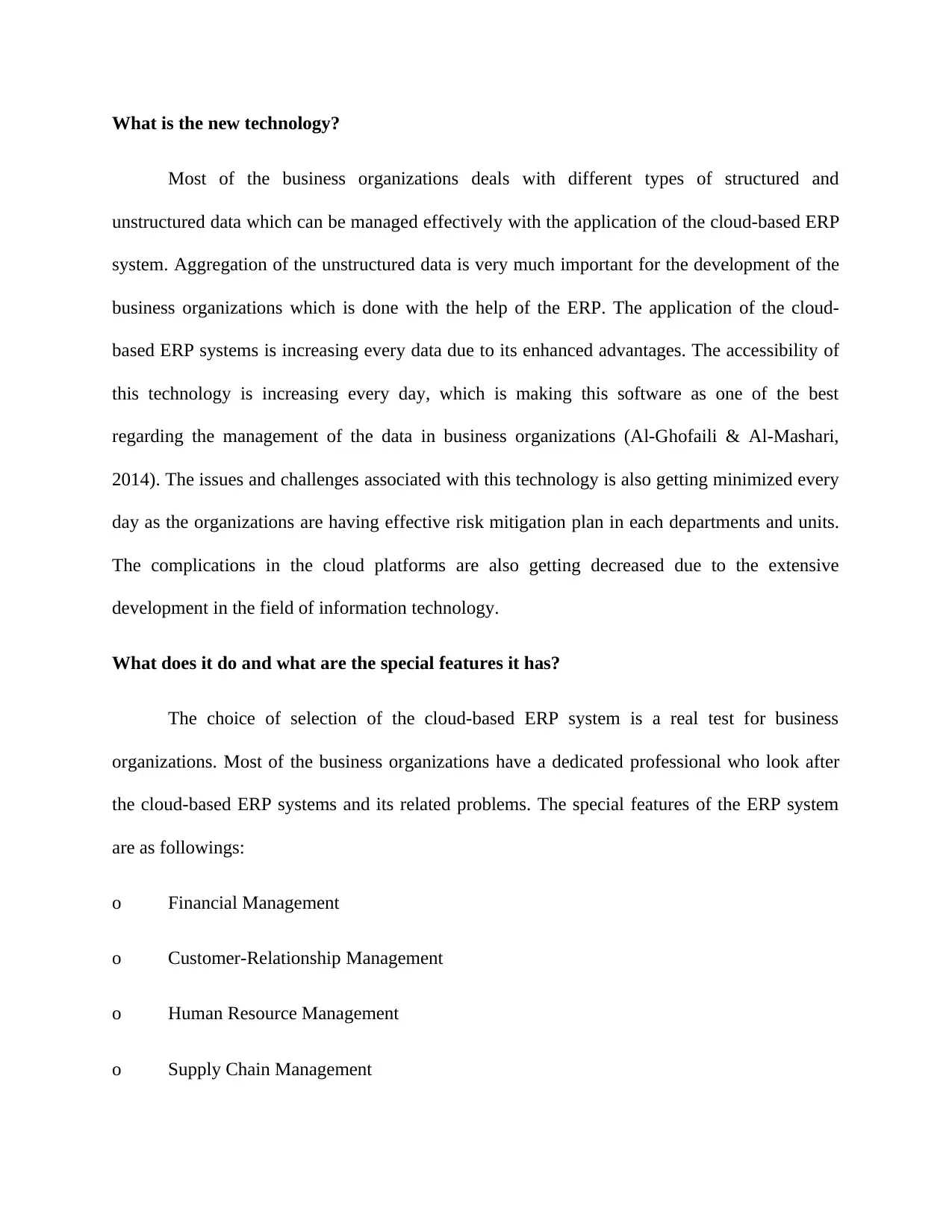
What is the new technology?
Most of the business organizations deals with different types of structured and
unstructured data which can be managed effectively with the application of the cloud-based ERP
system. Aggregation of the unstructured data is very much important for the development of the
business organizations which is done with the help of the ERP. The application of the cloud-
based ERP systems is increasing every data due to its enhanced advantages. The accessibility of
this technology is increasing every day, which is making this software as one of the best
regarding the management of the data in business organizations (Al-Ghofaili & Al-Mashari,
2014). The issues and challenges associated with this technology is also getting minimized every
day as the organizations are having effective risk mitigation plan in each departments and units.
The complications in the cloud platforms are also getting decreased due to the extensive
development in the field of information technology.
What does it do and what are the special features it has?
The choice of selection of the cloud-based ERP system is a real test for business
organizations. Most of the business organizations have a dedicated professional who look after
the cloud-based ERP systems and its related problems. The special features of the ERP system
are as followings:
o Financial Management
o Customer-Relationship Management
o Human Resource Management
o Supply Chain Management
Most of the business organizations deals with different types of structured and
unstructured data which can be managed effectively with the application of the cloud-based ERP
system. Aggregation of the unstructured data is very much important for the development of the
business organizations which is done with the help of the ERP. The application of the cloud-
based ERP systems is increasing every data due to its enhanced advantages. The accessibility of
this technology is increasing every day, which is making this software as one of the best
regarding the management of the data in business organizations (Al-Ghofaili & Al-Mashari,
2014). The issues and challenges associated with this technology is also getting minimized every
day as the organizations are having effective risk mitigation plan in each departments and units.
The complications in the cloud platforms are also getting decreased due to the extensive
development in the field of information technology.
What does it do and what are the special features it has?
The choice of selection of the cloud-based ERP system is a real test for business
organizations. Most of the business organizations have a dedicated professional who look after
the cloud-based ERP systems and its related problems. The special features of the ERP system
are as followings:
o Financial Management
o Customer-Relationship Management
o Human Resource Management
o Supply Chain Management
⊘ This is a preview!⊘
Do you want full access?
Subscribe today to unlock all pages.

Trusted by 1+ million students worldwide
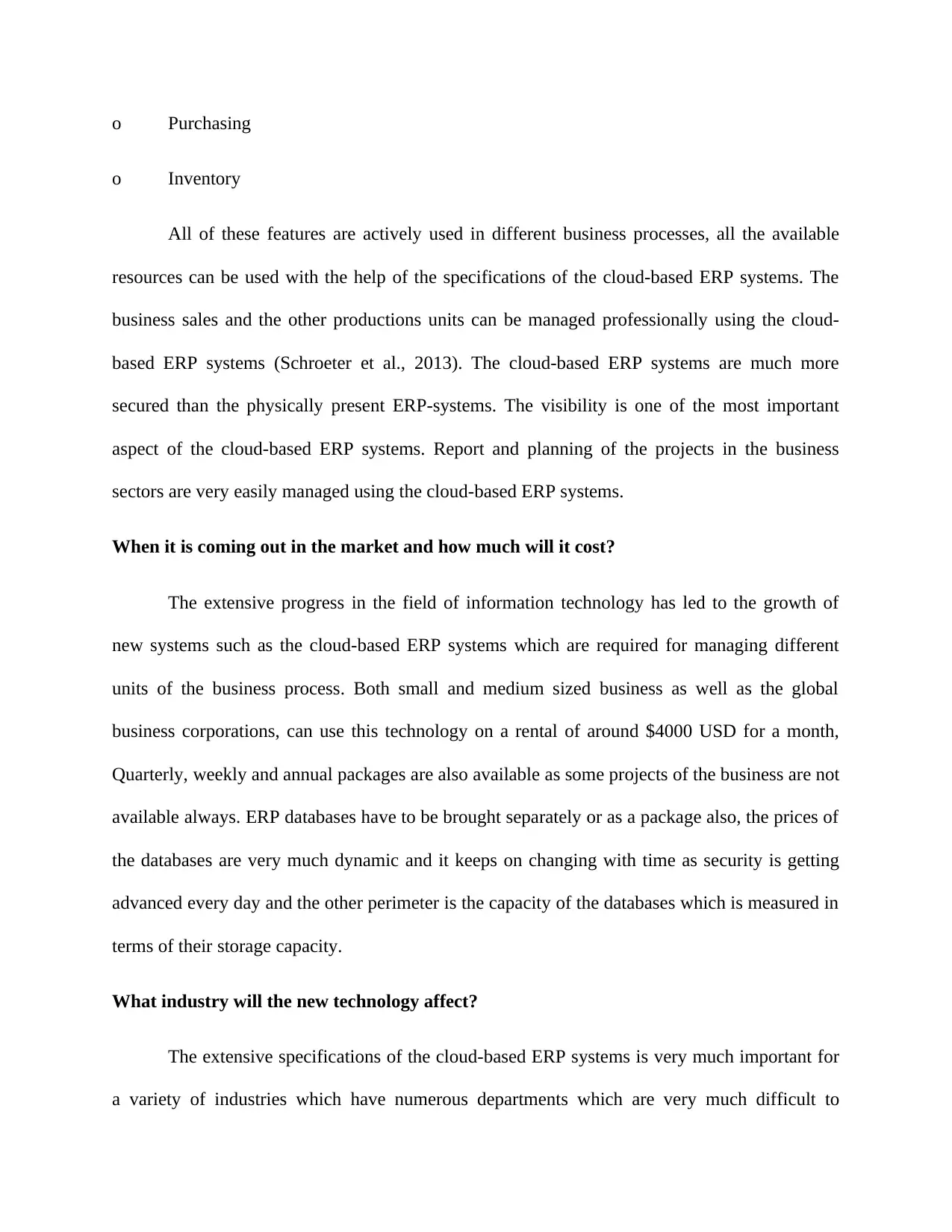
o Purchasing
o Inventory
All of these features are actively used in different business processes, all the available
resources can be used with the help of the specifications of the cloud-based ERP systems. The
business sales and the other productions units can be managed professionally using the cloud-
based ERP systems (Schroeter et al., 2013). The cloud-based ERP systems are much more
secured than the physically present ERP-systems. The visibility is one of the most important
aspect of the cloud-based ERP systems. Report and planning of the projects in the business
sectors are very easily managed using the cloud-based ERP systems.
When it is coming out in the market and how much will it cost?
The extensive progress in the field of information technology has led to the growth of
new systems such as the cloud-based ERP systems which are required for managing different
units of the business process. Both small and medium sized business as well as the global
business corporations, can use this technology on a rental of around $4000 USD for a month,
Quarterly, weekly and annual packages are also available as some projects of the business are not
available always. ERP databases have to be brought separately or as a package also, the prices of
the databases are very much dynamic and it keeps on changing with time as security is getting
advanced every day and the other perimeter is the capacity of the databases which is measured in
terms of their storage capacity.
What industry will the new technology affect?
The extensive specifications of the cloud-based ERP systems is very much important for
a variety of industries which have numerous departments which are very much difficult to
o Inventory
All of these features are actively used in different business processes, all the available
resources can be used with the help of the specifications of the cloud-based ERP systems. The
business sales and the other productions units can be managed professionally using the cloud-
based ERP systems (Schroeter et al., 2013). The cloud-based ERP systems are much more
secured than the physically present ERP-systems. The visibility is one of the most important
aspect of the cloud-based ERP systems. Report and planning of the projects in the business
sectors are very easily managed using the cloud-based ERP systems.
When it is coming out in the market and how much will it cost?
The extensive progress in the field of information technology has led to the growth of
new systems such as the cloud-based ERP systems which are required for managing different
units of the business process. Both small and medium sized business as well as the global
business corporations, can use this technology on a rental of around $4000 USD for a month,
Quarterly, weekly and annual packages are also available as some projects of the business are not
available always. ERP databases have to be brought separately or as a package also, the prices of
the databases are very much dynamic and it keeps on changing with time as security is getting
advanced every day and the other perimeter is the capacity of the databases which is measured in
terms of their storage capacity.
What industry will the new technology affect?
The extensive specifications of the cloud-based ERP systems is very much important for
a variety of industries which have numerous departments which are very much difficult to
Paraphrase This Document
Need a fresh take? Get an instant paraphrase of this document with our AI Paraphraser
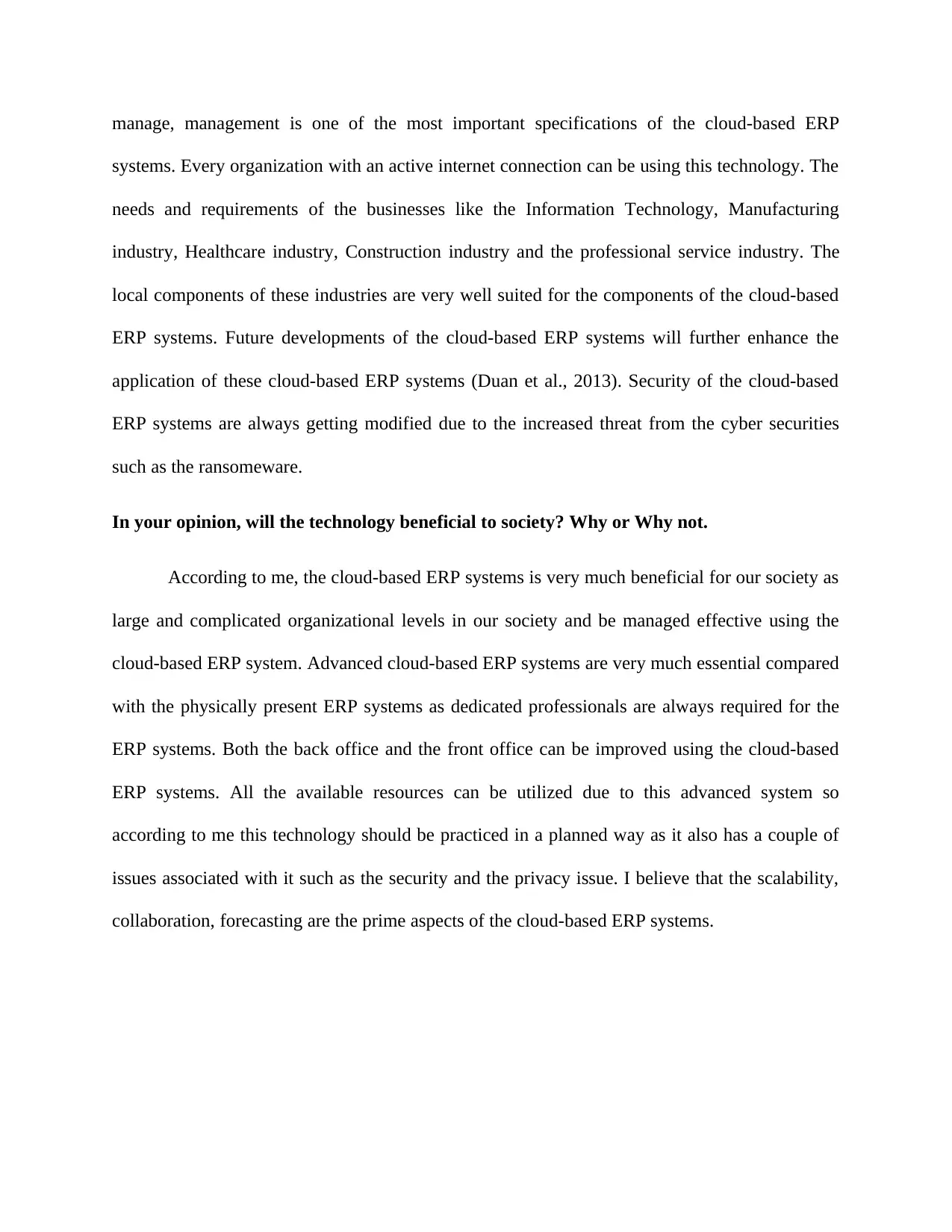
manage, management is one of the most important specifications of the cloud-based ERP
systems. Every organization with an active internet connection can be using this technology. The
needs and requirements of the businesses like the Information Technology, Manufacturing
industry, Healthcare industry, Construction industry and the professional service industry. The
local components of these industries are very well suited for the components of the cloud-based
ERP systems. Future developments of the cloud-based ERP systems will further enhance the
application of these cloud-based ERP systems (Duan et al., 2013). Security of the cloud-based
ERP systems are always getting modified due to the increased threat from the cyber securities
such as the ransomeware.
In your opinion, will the technology beneficial to society? Why or Why not.
According to me, the cloud-based ERP systems is very much beneficial for our society as
large and complicated organizational levels in our society and be managed effective using the
cloud-based ERP system. Advanced cloud-based ERP systems are very much essential compared
with the physically present ERP systems as dedicated professionals are always required for the
ERP systems. Both the back office and the front office can be improved using the cloud-based
ERP systems. All the available resources can be utilized due to this advanced system so
according to me this technology should be practiced in a planned way as it also has a couple of
issues associated with it such as the security and the privacy issue. I believe that the scalability,
collaboration, forecasting are the prime aspects of the cloud-based ERP systems.
systems. Every organization with an active internet connection can be using this technology. The
needs and requirements of the businesses like the Information Technology, Manufacturing
industry, Healthcare industry, Construction industry and the professional service industry. The
local components of these industries are very well suited for the components of the cloud-based
ERP systems. Future developments of the cloud-based ERP systems will further enhance the
application of these cloud-based ERP systems (Duan et al., 2013). Security of the cloud-based
ERP systems are always getting modified due to the increased threat from the cyber securities
such as the ransomeware.
In your opinion, will the technology beneficial to society? Why or Why not.
According to me, the cloud-based ERP systems is very much beneficial for our society as
large and complicated organizational levels in our society and be managed effective using the
cloud-based ERP system. Advanced cloud-based ERP systems are very much essential compared
with the physically present ERP systems as dedicated professionals are always required for the
ERP systems. Both the back office and the front office can be improved using the cloud-based
ERP systems. All the available resources can be utilized due to this advanced system so
according to me this technology should be practiced in a planned way as it also has a couple of
issues associated with it such as the security and the privacy issue. I believe that the scalability,
collaboration, forecasting are the prime aspects of the cloud-based ERP systems.
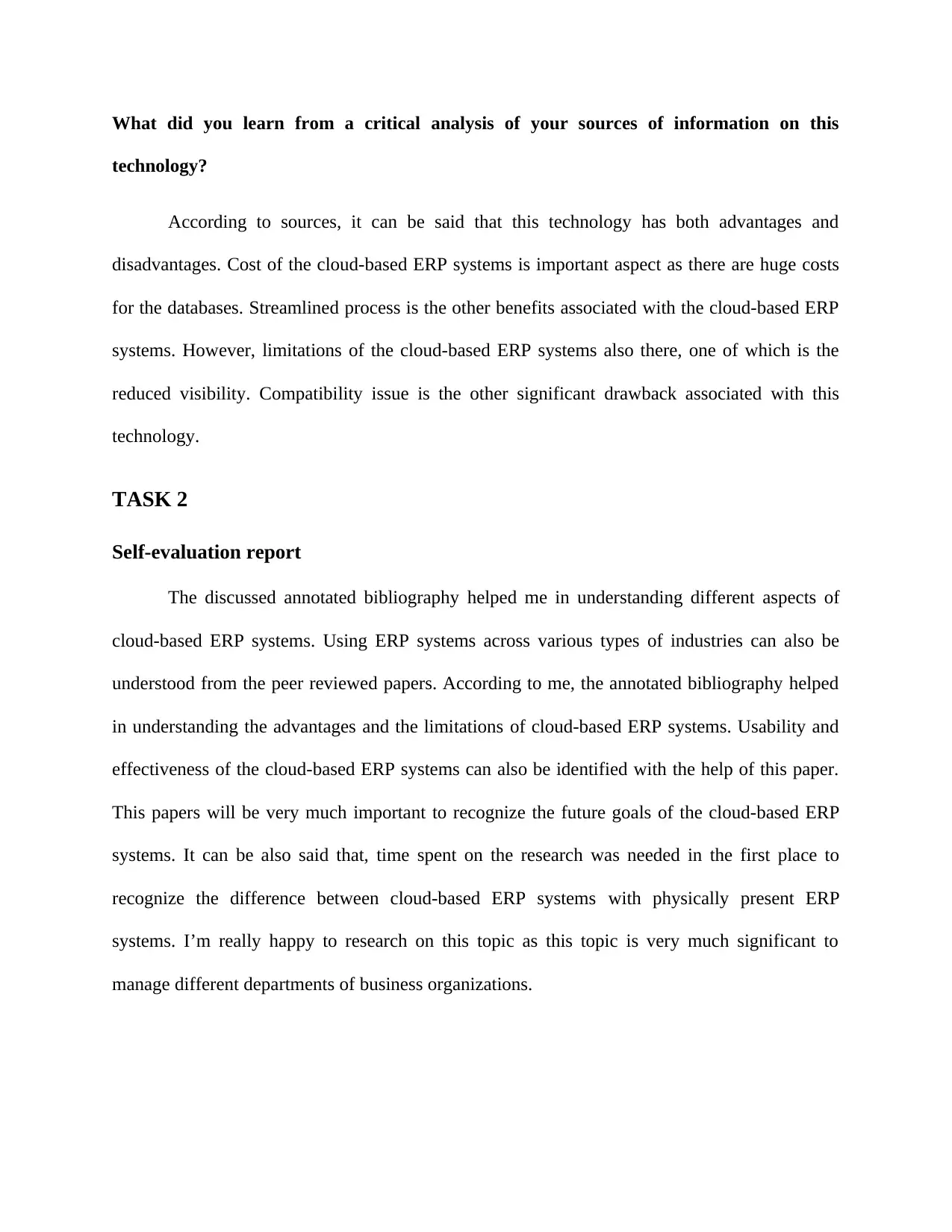
What did you learn from a critical analysis of your sources of information on this
technology?
According to sources, it can be said that this technology has both advantages and
disadvantages. Cost of the cloud-based ERP systems is important aspect as there are huge costs
for the databases. Streamlined process is the other benefits associated with the cloud-based ERP
systems. However, limitations of the cloud-based ERP systems also there, one of which is the
reduced visibility. Compatibility issue is the other significant drawback associated with this
technology.
TASK 2
Self-evaluation report
The discussed annotated bibliography helped me in understanding different aspects of
cloud-based ERP systems. Using ERP systems across various types of industries can also be
understood from the peer reviewed papers. According to me, the annotated bibliography helped
in understanding the advantages and the limitations of cloud-based ERP systems. Usability and
effectiveness of the cloud-based ERP systems can also be identified with the help of this paper.
This papers will be very much important to recognize the future goals of the cloud-based ERP
systems. It can be also said that, time spent on the research was needed in the first place to
recognize the difference between cloud-based ERP systems with physically present ERP
systems. I’m really happy to research on this topic as this topic is very much significant to
manage different departments of business organizations.
technology?
According to sources, it can be said that this technology has both advantages and
disadvantages. Cost of the cloud-based ERP systems is important aspect as there are huge costs
for the databases. Streamlined process is the other benefits associated with the cloud-based ERP
systems. However, limitations of the cloud-based ERP systems also there, one of which is the
reduced visibility. Compatibility issue is the other significant drawback associated with this
technology.
TASK 2
Self-evaluation report
The discussed annotated bibliography helped me in understanding different aspects of
cloud-based ERP systems. Using ERP systems across various types of industries can also be
understood from the peer reviewed papers. According to me, the annotated bibliography helped
in understanding the advantages and the limitations of cloud-based ERP systems. Usability and
effectiveness of the cloud-based ERP systems can also be identified with the help of this paper.
This papers will be very much important to recognize the future goals of the cloud-based ERP
systems. It can be also said that, time spent on the research was needed in the first place to
recognize the difference between cloud-based ERP systems with physically present ERP
systems. I’m really happy to research on this topic as this topic is very much significant to
manage different departments of business organizations.
⊘ This is a preview!⊘
Do you want full access?
Subscribe today to unlock all pages.

Trusted by 1+ million students worldwide
1 out of 16
Related Documents
Your All-in-One AI-Powered Toolkit for Academic Success.
+13062052269
info@desklib.com
Available 24*7 on WhatsApp / Email
![[object Object]](/_next/static/media/star-bottom.7253800d.svg)
Unlock your academic potential
Copyright © 2020–2026 A2Z Services. All Rights Reserved. Developed and managed by ZUCOL.





